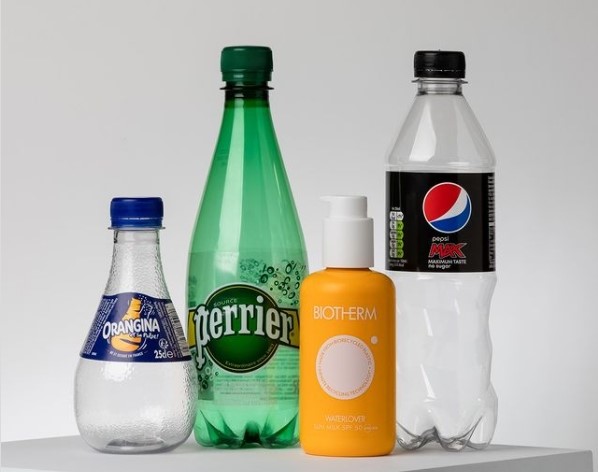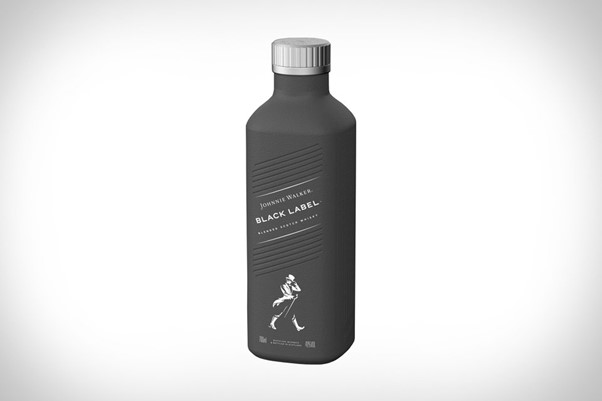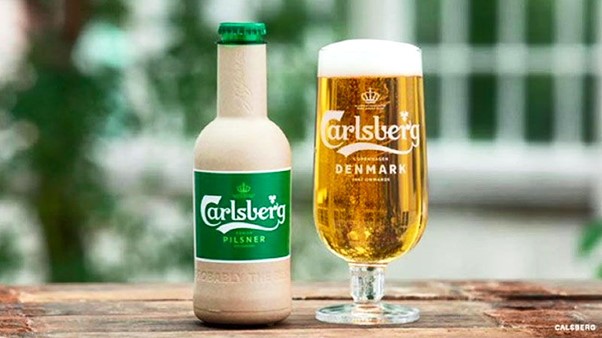‘World’s first’ enzymatically recycled bottles developed for PepsiCo, Suntory and Nestlé
펩시, 산토리 및 네슬레용으로 개발된 '세계 최초' 효소 재활용 병

In an industry first, food-grade PET plastic bottles produced entirely from enzymatically recycled plastic have been developed for brands Perrier, Orangina, and Pepsi Max.
업계 최초로 페리에, 오렌지나, 펩시 맥스 브랜드를 위해 완전히 효소 재활용 플라스틱으로 생산된 식품 등급의 PET 플라스틱 병이 개발되었다.
Globally, around 70 million tons of polyethylene terephthalate (PET) plastic are manufactured every year. This equates to around 20% of all plastic produced.
세계적으로 매년 약 7천만 톤의 폴리에틸렌 테레프탈레이트(PET) 플라스틱이 생산된다. 이는 생산된 모든 플라스틱의 약 20%에 해당한다.
However, plastic used in packaging degrades over time through repeated conventional thermomechanical processes, meaning that new virgin plastic is required to retain its quality.
그러나 포장에 사용되는 플라스틱은 시간이 지남에 따라 기존의 열역학 공정을 반복함으로써 품질이 저하되며, 이는 새로운 새로운 플라스틱이 그 품질을 유지하기 위해 필요함을 의미한다.
Now, French biotech company Carbios has developed the ‘world’s first’ food-grade PET plastic bottles produced entirely from enzymatically recycled plastic, which it said makes the promise of endlessly recycled plastic ‘one step closer’.
이제 프랑스 생명공학 회사인 카르비오스는 완전히 효소적으로 재활용된 플라스틱으로 생산된 '세계 최초의' 식품 등급의 PET 플라스틱 병을 개발했는데, 이것은 무한 재생 플라스틱에 대한 약속을 '한 걸음 더 다가서게' 한다고 말했다.
Consumer brands back innovation
혁신을 뒷받침하는 소비자 브랜드
The sample bottles are the result of a consortium established by Carbios and L’Oréal in 2017. Two years later, in 2019, the founders were joined by Nestlé Waters, PepsiCo, and Suntory Beverage & Food Europe.
이 샘플병은 카비오스와 로레알이 2017년 설립한 컨소시엄의 결과물이다. 2년 후인 2019년에는 네슬레 워터스, 펩시, 산토리 음료 & 푸드 유럽이 창립자들에게 합류하였다.
The consortium’s objective is to industrialise recycling technology designed and developed by Carbios and, in doing so, promote the circular economy of plastics.
이 컨소시엄의 목표는 카비오스가 설계 및 개발한 재활용 기술을 산업화하고 이를 통해 플라스틱의 순환 경제를 촉진하는 것이다.
Having successfully manufactured sample bottles of consortium brands Biotherm, Perrier, Pepsi Max, and Orangina, the companies are now working to scale this innovation to help meet the global demand for sustainable packaging solutions.
컨소시엄 브랜드 인 Biotherm, Perrier, Pepsi Max 및 Orangina의 샘플 병을 성공적으로 제조 한이 회사는 현재 지속 가능한 포장 솔루션에 대한 글로벌 수요를 충족하기 위해이 혁신을 확장하기 위해 노력하고 있다.
“The consortium objective is to provide this eco-friendly solution at commercial scale to consumers and inform them that this product can be fully and endlessly recycled once deposed of,” a Carbios spokesperson told this publication.
"컨소시엄의 목표는 이 친환경 솔루션을 상업적인 규모로 소비자에게 제공하고 이 제품이 폐기되면 완전하고 끝없이 재활용될 수 있다는 것을 알리는 것입니다,"라고 카비오스의 대변인은 이 출판물에 말했다.
Indeed, Carbios revealed that this coming September, it will break ground on a demonstration plant. By 2025, the green biotech firm will have launched a 40,000-ton capacity industrial facility.
실제로 카르비오스는 오는 9월에 시범공장을 착공할 것이라고 밝혔다. 그린바이오텍은 2025년까지 4만 t 규모의 산업시설을 가동할 예정이다.
What is enzymatically recycled plastic?
효소적으로 재활용되는 플라스틱은 무엇인가?
The innovation is the culmination of close to 10 years’ R&D to ‘supercharge’ a biological tool, called an enzyme, and create a recycling process that uses it, explained the spokesperson.
이 혁신은 효소라고 불리는 생물학적 도구를 '초과 충전'하고 그것을 사용하는 재활용 과정을 만들기 위한 거의 10년간의 R&D의 절정이라고 대변인은 설명했다.
“This enzyme – cutinase – occurs naturally in compost heaps, helping to break down leaf membranes of dead plants. By optimising this enzyme, Carbios scientists in collaboration with the Toulouse Biotechnology Institute, have fine-tuned the technology to break down any kind of PET plastic into its original building blocks, which can then be turned back into like-new, virgin-quality plastic (without the need to add actual virgin plastic).”
"큐티나아제라는 이 효소는 퇴비 더미에서 자연적으로 발생하며 죽은 식물의 잎 막을 분해하는 데 도움을 줍니다. 이 효소를 최적화함으로써, Toulez Biotechnology Institute와 협력하여, 모든 종류의 PET 플라스틱을 원래의 빌딩 블록으로 분해하는 기술을 미세 조정했습니다. PET 플라스틱은 (실제 새로운 플라스틱을 추가할 필요 없이) 마치 새로운 품질의 플라스틱으로 다시 바뀔 수 있습니다."

An enzyme is a natural protein that significantly speeds up the rate of chemical reactions. Essentially, it is a catalyst made by stringing together amino acids in a very specific and unique order. The chain of amino acids then folds into a highly specific shape.
효소는 화학 반응 속도를 현저하게 높이는 천연 단백질이다. 본질적으로, 이것은 아미노산을 매우 구체적이고 독특한 순서로 끈으로 묶어 만든 촉매이다. 아미노산의 사슬은 매우 특정한 모양으로 접힌다.
“A good image of the role of an enzyme is to [envisage] an enzyme as having a lock, with the PET polymer being the key,” the spokesperson explained. “The shape of lock is perfectly adapted to the key, and once that connection has been made, the reaction can occur.”
"효소의 역할에 대한 좋은 이미지는 PET 중합체가 열쇠가 되는 효소를 자물쇠가 있는 효소로 상상하는 것입니다,"라고 대변인이 설명했다. "잠금 장치의 모양이 키에 완벽하게 맞춰져 있고, 일단 연결이 되면 반응이 일어날 수 있습니다."

Carbios claims the new enzymatic process is 10,000 times more efficient than any other biological plastic recycling trials to date, breaking down 97% of PET plastic in just 16 hours. “It produces feedstock, made entirely of enzymatically recycled post-consumer PET plastic waste that companies can use to manufacture new plastic bottles with, that are endlessly recyclable,” we were told.
Carbios는 새로운 효소 과정이 지금까지의 다른 생물학적 플라스틱 재활용 실험보다 10,000배 더 효율적이며 단 16시간 만에 97%의 PET 플라스틱을 분해한다고 주장한다. "이 공장은 완전히 효소적으로 재활용된 사후 소비자 PET 플라스틱 폐기물로 제조된 원료를 생산하는데, 이 원료는 업체들이 새로운 플라스틱 병을 제조하는 데 사용할 수 있으며, 이는 끝없이 재활용할 수 있습니다."라고 Seagate는 설명했다.
개발 과제
Unsurprisingly, the key technical challenge facing Carbios was working with the enzyme itself. Enzymes are already used in numerous applications, from detergents to biofuels, textiles and food processing, but using them for the recycling of polymers hadn’t been considered.
당연하게도, Carbios가 직면한 주요 기술적 과제는 효소 자체였다. 효소는 이미 세제에서 바이오 연료, 섬유, 식품 가공에 이르기까지 수많은 용도에 사용되고 있지만, 고분자의 재활용을 위해 효소를 사용하는 것은 고려되지 않았다.
“Carbios was the first company in the world to apply the use of enzymes in the plastics industry. This innovative approach represented a real technological challenge,” explained the spokesperson.
“Carbios는 플라스틱 산업에 효소 사용을 적용한 세계 최초의 회사입니다. 이 혁신적인 접근 방식은 진정한 기술적 과제를 나타냅니다.”라고 대변인은 설명했다.
After the identification of a natural occurring enzyme, the sequence and the thermostability of the enzyme had to be drastically improved to achieve the level of performance reached today, we were told.
자연적으로 발생하는 효소를 확인한 후, 효소의 서열과 열 안정성은 오늘날 도달 한 수준의 성능을 달성하기 위해 획기적으로 개선되어야 한다고 들었다.
“The ambition of Carbios has always been to bridge the gap between biology and the plastic industry to ensure that plastic could enter a virtuous cycle and never become waste.
"Carbios의 야망은 항상 생물학과 플라스틱 산업 간의 격차를 해소하여 플라스틱이 선순환으로 진입하고 폐기물이 되지 않도록 하는 것이었습니다.
“This was once thought to be impossible, but after years of research and engagement, this consortium of some of the world’s biggest brands has proved the potential of this singular approach based on the use of enzymes.”
"한 때 이것은 불가능하다고 여겨졌지만, 수년 간의 연구와 참여 끝에, 세계 최대 브랜드들로 구성된 이 컨소시엄은 효소의 사용을 바탕으로 한 이 특별한 접근법의 가능성을 증명했습니다."
지속가능성 소망
The consumer brands backing the development say the new enzymatically recycled bottles align with their sustainability strategies.
개발을 지지하는 소비자 브랜드들은 새로운 효소 재활용 병들이 그들의 지속 가능 전략과 일치한다고 말한다.
Nestlé Waters, for example, said it was exciting to see that the quality of the prototype bottles made from coloured recycled PET materials is ‘virtually identical’ to clear virgin PET. “When we reach industrial scale, this enzymatic recycling technology will enable us to produce high-quality rPET bottles and help Nestlé Waters in our journey to boost the circular economy and reduce the use of virgin plastics,” noted Head of Packaging Material Science and Environmental Sustainability Jean-Francois Briois.
예를 들어, 네슬레 워터스는 색깔이 있는 재활용 PET 재료로 만든 시제품 병의 품질이 깨끗한 순수 PET와 '사실상 동일'하다는 것을 알게 되어 흥분된다고 말했다. "산업 규모에 도달하면, 이 효소 재활용 기술을 통해 고품질 rPET 병을 생산할 수 있고 순환 경제를 활성화하고 새로운 플라스틱의 사용을 줄이기 위한 여정에서 네슬레 워터스를 도울 수 있을 것입니다."라고 장 프랑수아 브리아 포장재 과학 및 환경 지속가능성 책임자는 말했다.
Suntory Beverage & Food Europe, too, associated the development to its sustainable plastic target. “The global issue of plastic waste requires transformational thinking, creative partnerships and innovative brands coming together to seek out new solutions,” said Chief R&D Officer Roberto Vanin.
산토리 음료 & 푸드 유럽 역시 이 개발을 지속 가능한 플라스틱 목표와 연관지었다. 로베르토 바닌 R&D 최고책임자는 "플라스틱 폐기물의 세계적 이슈는 새로운 해결책을 찾기 위해 혁신적 사고, 창조적 파트너십, 혁신적인 브랜드가 함께해야 한다"고 말했다.

“Continued investment in new ways of tackling waste and creating true circularity such as this ground-breaking technology from Carbios will be key to Suntory Beverage and Food Europe achieving its 100% sustainable plastic ambition.”
"폐기물을 처리하고 Carbios의이 획기적인 기술과 같은 진정한 순환 성을 만드는 새로운 방법에 대한 지속적인 투자는 Suntory Beverage and Food Europe이 100 % 지속 가능한 플라스틱 야망을 달성하는 데 핵심이 될 것입니다."
PepsiCo said it was committed to building a circular economy to achieve its vision that ‘packaging never becomes waste’. “We are dedicated to reducing the virgin plastic we use and with the breakthrough Carbios enzymatic recycling technology, we can help keep valuable material in the circular economy, reduce waste and take another step towards a truly closed loop system,” noted Ron Khan, Global VP of Packaging, Beverages.
펩시는 '포장이 결코 낭비가 되지 않는다'는 비전을 달성하기 위해 순환 경제를 구축하기 위해 노력하고 있다고 말했다. "우리는 우리가 사용하는 새로운 플라스틱을 줄이는 데 전념하고 있으며 혁신적인 카비오스 효소 재활용 기술을 통해 순환 경제에서 귀중한 자재를 유지하고 폐기물을 줄이며 진정한 폐쇄 루프 시스템을 향한 또 다른 발걸음을 내딛을 수 있습니다."라고 글로벌 VP인 Ron Khan이 말했다.

※ 한편, 국내에서도 화학적 변화로 플라스틱을 무한 재활용할 수 있는 기술이 개발되고 있다. 국내 에너지·소재 기업인 한화솔루션은 화학적 재활용의 하나인 'PTC(Plastic-to-Chemical)' 기술을 개발 중이다.
이는 폐플라스틱을 화학적으로 분해해 '나프타'를 추출하는 방식으로, 추출한 성분은 나프타분해설비(NCC)를 통해 다시 에틸렌과 프로필렌 같은 플라스틱 기초 원료로 사용할 수 있다. 한화솔루션은 PTC 기술이 상용화되면 폐플라스틱의 무한 재활용이 가능해질 것이라고 발표했다.

JOHNNIE WALKER PAPER SCOTCH BOTTLE

종이 병에 든 칼스버그 맥주
'얄팍다식 & 경제 > 식품 정보(스타트업)' 카테고리의 다른 글
| 쇠고기 대 식물 기반 유사체: '이 제품들은 영양학적으로 상호 교환 가능한 것으로 간주되어서는 안 된다' (0) | 2021.07.19 |
|---|---|
| 프랑스의 거의 모든 인구가 중금속에 오염되어 있다는 연구 결과가 나왔다. (0) | 2021.07.15 |
| 카나비스는 새로운 식문화를 촉진할 수 있다 (0) | 2021.06.30 |
| 대체 단백질에 대한 투자가 사상 최대인 31억 달러에 달하다 (0) | 2021.06.29 |
| 단백질로 가득 찬 도넛 제조업체, '차세대 오레오'를 목표로 (0) | 2021.06.28 |